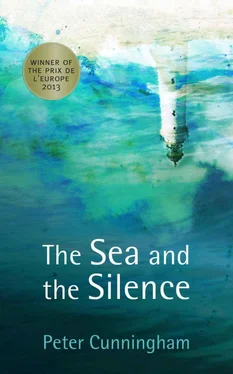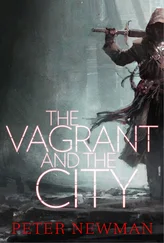‘These sailings are never on time,’ Tom kept saying.
‘What will he do if I don’t turn up?’
‘He has to go, Iz. It’s too dangerous for him here.’
I put my head down so that I would not have to witness every new, agonising mile. We had somehow crossed the mountains and were now chugging up the coast by the seaside town of Bray. The car’s engine coughed and struggled and fine puffs of steam wafted in zephyr-like beneath my feet. I caught sight of the dark bay which our mail boat would soon cross, the grey-streaked night water and the distant hump of Howth on the other side. It was now half past seven.
‘Oh, God!’
A long vessel was putting out to sea.
‘That’s not her,’ Tom said.
‘How do you know?’
‘That’s a cargo ship.’
I could not speak. I would die, I knew, if I were to see his ship on its way. Fresh sweat had broken out the breadth of Tom’s blood-streaked forehead and was causing the blood that had congealed there to drip anew.
‘Don’t worry, we’ll make it,’ he said.
The road curved inland and the sea was lost. We passed through another village of dim streetlights. Abruptly, Tom swung right, down a narrow lane with house fronts on one side and a high wall on the other. Then the sea jumped out at us, the black vastness of it, and I could see the great, brooding outline of a ship at moorings and smoke rising from her single funnel.
‘That’s her,’ Tom grinned.
I wanted to throw my arms around his neck and tell him how I would never forget him, how he had risked so much not for some cause or spent idea, but just for his friend. He was straining now to see as we slowed down and drove along the grey wharf by the mail boat’s stern.
‘Where did he say he’d meet us?’
‘He didn’t. But he’ll have to be somewhere near the gangway. He’s got your ticket,’ Tom said.
People were walking back to the quayside, many of them turning and waving up to passengers on deck. Lights flickered yellowly. The Morris jolted to a halt and we got out. The whole quayside reverberated to a massive blast from the mail boat’s hooter. Then I saw him. He must have been standing in the shadow of heaped crates and boxes near the foot of the gangplank. I laughed. I wanted to tell him how incredible he was, how handsome, how beautiful I felt. I started to run. I laughed out loud. I wanted to tell him about the upturned ass-cart, about the wrecked saloon car of the stupid guards or whoever they had been, about Nick’s meanness and about how Tom was the best friend in the world. And he saw me laughing and he opened his mouth to tell me something, and he too was laughing, perhaps at the thought of how he’d squeezed out of the Wicklow, or maybe he was thinking of how this was just the first of many voyages that lay ahead of us, and how it had always been meant, from the very start, to work out for the best like this.
And then Tom screamed.
‘ No! Frank! It’s a trap! ’
We were converging on the gangplank from both sides. I turned just as the boat’s hooter erupted again, and saw Tom’s mouth open, but could hear nothing. And then we were alone, the three of us in the whole area, but not alone because all around us were men with outstretched arms, pointing, and I saw Tom catch himself with both hands at his chest and spin.
‘Frank?’
From far off I heard a man’s shout.
‘ Halt! ’
Frank was ten yards from me. As he ran, he reached into the pocket of his jacket. I saw him gasp as the air was punched out of him, then heard the sharp snap of gunfire. His head went back and his body seemed to buck, as if trying to shrug off the attack, as if this was something he had often dealt with before. He fell, one leg twisted beneath him.
‘ Frank! ’
He looked asleep. He would open his eyes now and reach for my hand. I went to him. Blood thick on his lips. In his nostrils.
‘ He’s not dead! ’
I fought them. My arms were held.
‘ Frank! ’
I screamed until one of them clamped his hand over my mouth. I bit him and he cursed and slapped me hard. I was glad he did that, but I would have preferred if he’d shot me. I lunged at him and he hit me again.
‘Take this mad bitch away.’
As two big guards in uniform caught hold of me, I saw one of the plainclothes men squat down and gingerly catch Frank’s wrist and pluck out his hand from his jacket. The brown envelope with the tickets was between his fingers.
1945
On the first day of April, it began to rain before I got up, and when I did, eventually, the lawns of Longstead were mostly under an inch of water. Mother would be unable to set up out of doors. On the back landing beyond my bedroom, the strategic metal pail would prove its long-time use as the leak in some inaccessible gully reconfirmed its existence.
What had come to me out of the quivering emptiness of the intervening weeks was the silence. No one said anything. I could understand how Mother, who had her own grief to deal with, and the remaining staff at Longstead, who must have been fearful for the roof over their heads, would remain taciturn about an event that had made the front pages of the papers — two suspected subversives shot dead on the quay in Dún Laoghaire and the arrest and subsequent release of a Miss Ismay Seston in connection with the same incident — but the people I might have expected to comment never did. Neither Mr Rafter nor his son, John, when I encountered them, ever mentioned what everyone knew, but rather their eyes assumed an empty expression as if I were formless, someone on whom it was not possible to focus. The Misses Carr drove over in a trap pulled by matching bays and twittered around Mother for most of one afternoon, then clipped away at four p.m., having never allowed their eyes to rest on me for more than the briefest moment. Neither did Bella nor Nick in the days before their delayed departure speak to me about the events in Dún Laoghaire, nor of the murder of the man I loved and his friend; I was glad, for I did not wish to discuss it with them, but it still amazed me that they had not brought it up. No word came from Mount Penrose. That brought me no relief, for I knew Norman had been walking our acres and that he knew I was at home. Had he decided to be done with me he would, in Penrose fashion, have written, terminating our engagement and probably asking for the return of his mother’s ring. In reality, he was biding his time, like a patient hunter awaiting the low point in his quarry’s resistance before striking home. In a wider sense, I expected farther visits from the guards, or army, or indeed from newspapers; there were none. It was as if something too shameful to address had taken place. Soon it would be as if it had all never happened.
I felt at first benumbed, then fearful, then almost nothing. I slept for days. I could see his face in every detail and clung to that image. I rarely went outside, staying upstairs in my room, sleeping. That was where I did my crying.
Time became shapeless. On freezing nights, I crawled to the window like something fossilised and beheld the obscenely peeping stars. Weights dragged me down from where I wheeled in dizzy rings. In the ever folding darkness, my arms flapped and my shoulders stammered their helplessness. I could grasp nothing, just lay there, parched of mercy. Dawns came in atoms of blinding daylight that bore into my head. I reeled beneath the blur of awful colours and through my pounding blood saw the new day with its dull red rind. Cries of grief burst within me but were smothered as they floated upwards. Barely knowing, I skimmed the icy steppes of my new memory for one extra moment of him. I craved that speck of time between his life and death so that I could ease myself into it and remain there forever. I began to wonder what had happened to the love we had shared, because we had kindled something beyond ourselves, a force too strong to be kept underground. I felt at times irrationally certain that what I had been through was a dream and that I would see his living face again.
Читать дальше












![Edward Ellis - Adrift on the Pacific - A Boys [sic] Story of the Sea and its Perils](/books/753342/edward-ellis-adrift-on-the-pacific-a-boys-sic-s-thumb.webp)